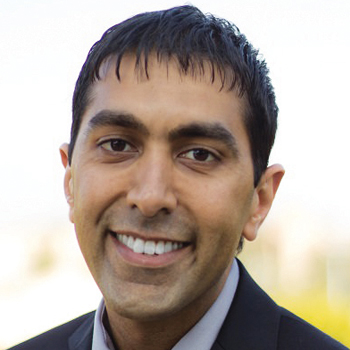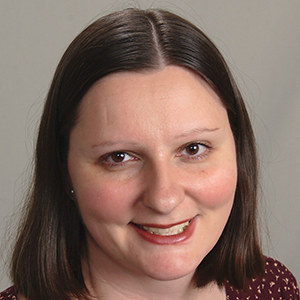Garg made organic chemistry one of UCLA’s most popular classes
Neil Garg is a chemistry professor with a mission to change the way organic chemistry is taught. For his classroom innovations, he has won the 2019 American Society for Biochemistry and Molecular Biology Award for Exemplary Contributions to Education.

“It is a tremendous honor to receive the ASBMB Award for Exemplary Contributions to Education.Organic chemistry has been viewed as a weed-out class for decades, but at UCLA, we are challenging our students to overcome such preconceived notions.We want our students to appreciate how organic chemistry relates to biology and modern medicine.We also use the class as a vehicle for students to learn impeccable problem solving skills that will benefit them in all of their future endeavors.”
— Neil Garg
Organic chemistry is not a class that people typically think of as being fun. But Garg’s Chemistry 14D: Organic Reactions and Pharmaceuticals is a popular course at the University of California, Los Angeles. Garg describes real-life applications in his classes, and students say that he makes a personal connection with every one of his nearly 400 individuals in the classroom, according to an article on the UCLA Newsroom website.
Catherine Clarke, a professor and chair of chemistry and biochemistry at UCLA, nominated Garg for the award, explaining that he has succeeded with Chem 14D because he can explain concepts clearly and teach problem-solving skills. He also is able to integrate established and innovative teaching methods — for example, with an assignment in which students can produce chemistry music videos.
“Simply put, Neil has been an amazing teacher and his impact on chemical and biochemical education has been transformative,” Clarke wrote in her nomination letter.
Garg earned his undergraduate degree in chemistry from New York University and a Ph.D. from the California Institute of Technology, where, in Brian Stoltz’s lab, he synthesized several dragmacidin alkaloids possessing anti-viral and anti-cancer activities. He did postdoctoral work in Larry Overman’s lab at the University of California, Irvine, where he completed the total synthesis of the bioactive alkaloid sarain A.
Since joining the UCLA faculty in 2007, Garg has helped develop many educational tools to help students, including an app called Backside Attack, an online tool called QR Chem and an online tutorial, BACON, short for Biology and Chemistry Online Notes. He also wrote and self-published an organic chemistry coloring book for children.
Justin Bañaga, who took Garg’s classes as an undergraduate, supported the award nomination with a letter. “Dr. Garg has a unique teaching style that sets him apart from other professors,” Bañaga wrote. “He inspires and captivates his students with his highly entertaining and enjoyable lectures and devises ingenious methods of combining fun facts with notable information to help his students learn the depth and immense amount of material that he covers.”
In another letter of nomination, Robert Grubbs, a chemistry professor at the California Institute of Technology, wrote, “Garg has also done amazing things in undergraduate education and is clearly one of the best university educators in the country.”
Garg has won numerous honors, including UCLA’s Harvey L. Eby Award for the Art of Teaching. He also competed for and won the Robert Foster Cherry Award, which is the largest university teaching prize and spans all fields of academia.
Garg will receive his award during the ASBMB annual meeting at the Experimental Biology 2019 conference in Orlando, where he will deliver an award lecture titled “How organic chemistry became one of UCLA’s most popular classes” at 3 p.m. April 7 in Valencia Ballroom A at the Orange County Convention Center.
Enjoy reading ASBMB Today?
Become a member to receive the print edition four times a year and the digital edition monthly.
Learn moreGet the latest from ASBMB Today
Enter your email address, and we’ll send you a weekly email with recent articles, interviews and more.
Latest in People
People highlights or most popular articles

Sketching, scribbling and scicomm
Graduate student Ari Paiz describes how her love of science and art blend to make her an effective science communicator.

Embrace your neurodivergence and flourish in college
This guide offers practical advice on setting yourself up for success — learn how to leverage campus resources, work with professors and embrace your strengths.

Survival tools for a neurodivergent brain in academia
Working in academia is hard, and being neurodivergent makes it harder. Here are a few tools that may help, from a Ph.D. student with ADHD.

Quieting the static: Building inclusive STEM classrooms
Christin Monroe, an assistant professor of chemistry at Landmark College, offers practical tips to help educators make their classrooms more accessible to neurodivergent scientists.

Hidden strengths of an autistic scientist
Navigating the world of scientific research as an autistic scientist comes with unique challenges —microaggressions, communication hurdles and the constant pressure to conform to social norms, postbaccalaureate student Taylor Stolberg writes.

Richard Silverman to speak at ASBMB 2025
Richard Silverman and Melissa Moore are the featured speakers at the ASBMB annual meeting to be held April 12-15 in Chicago.

